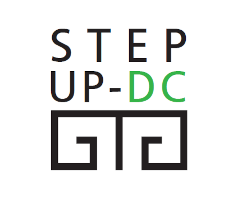Session 7C, DRAMA EDUCATION -2 - Education for Democratic Citizenship: Drama/Theatre Education as a Democratic Process of Learning in Primary Education
STEPUP-DC Project

Course DescriptionBasic Topics
Aristophanes The Birds as an ideal Utopia to re-examine and re-define democratic values for secondary schools needs and environments
Duration
The duration of the session is 9 hours (3 reading + 3 learning + 3 working/practicing)
Objectives
The Objectives of this session are:
- Support students in developing in-depth, critical understanding of the role of education and particularly of formal education in the development of young citizens’ political socialisation via Theatre
- Support students in developing critical understanding of view of education as a fundamental right and confidence in exploring the implications of this for educational practice.
- Develop students’ confidence in leading initiatives and developing educational programmes on EDC/HRE/IE through Theatre Education
Learning outcomes
After completion of the session students will:
- Be able to guide pupils in critically examine and express key concepts related to democratic culture and intercultural dialogue through theatre methodologies and texts which refer to democratic practices and dialogical learning.
- To re-examine and experiment with drama based teaching methods which support the interaction of theatre and democracy from the ancient era (5 BC) till 21st Century
- To create lessons and teach theatre/drama in secondary based on democratic culture and practices, by researching plays of Aristophanes.
Outcomes and CDC
- Knowledge and critical understanding
- 1802: Can describe the ways in which his/her thoughts and emotions influence his/her behaviour (basic)
- 1901: Can explain how tone of voice, eye contact and body language can aid communication (basic)
- 1904: Can explain how different forms of language are used in different situations and contexts (intermediate)
- 2012: Can describe the diverse ways in which citizens can influence policy (advanced)
- 2014: Can reflect critically on the nature and purposes of democratic political processes (advanced)
- Values
- Valuing democracy, justice, fairness, equality and the rule of law
- 108: Expresses the view that all laws should be consistent with international human rights norms and standards (advanced)
- 301: Argues that schools should teach students about democracy and how to act as a democratic citizen (basic)
- 304: Argues that fair and just laws should always be respected and obeyed (basic)
- 319: Expresses the view that information on public policies and their implementation should be made available to the public (advanced)
- Attitudes
- 503: Expresses respect for different opinions, world views and ways of life unless they violate human rights (basic)
- 607: Expresses an interest in public affairs and issues (intermediate)
- 610: Expresses commitment to sustaining and safeguarding the human rights of other people (intermediate)
- 611: Is actively involved in community issues (intermediate/advanced)
- 706: Shows that he/she takes responsibility for own mistakes (intermediate)
- 824: Shows confidence that he/she can deal efficiently with unexpected events (advanced)
- Skills
- 1010: Looks for information in a variety of sources (basic/intermediate)
- 1020: Seeks out new opportunities for learning (intermediate/advanced)
- 1109: Can make connections between arguments and information (basic/intermediate/)
- 1212: Uses other people’s non-verbal cues to identify their unspoken thoughts or concerns (intermediate/advanced)
Aristophanes The Birds as an ideal Utopia to re-examine and re-define democratic values for secondary schools needs and environments
The duration of the session is 9 hours (3 reading + 3 learning + 3 working/practicing)
The Objectives of this session are:
- Support students in developing in-depth, critical understanding of the role of education and particularly of formal education in the development of young citizens’ political socialisation via Theatre
- Support students in developing critical understanding of view of education as a fundamental right and confidence in exploring the implications of this for educational practice.
- Develop students’ confidence in leading initiatives and developing educational programmes on EDC/HRE/IE through Theatre Education
After completion of the session students will:
- Be able to guide pupils in critically examine and express key concepts related to democratic culture and intercultural dialogue through theatre methodologies and texts which refer to democratic practices and dialogical learning.
- To re-examine and experiment with drama based teaching methods which support the interaction of theatre and democracy from the ancient era (5 BC) till 21st Century
- To create lessons and teach theatre/drama in secondary based on democratic culture and practices, by researching plays of Aristophanes.
- Knowledge and critical understanding
- 1802: Can describe the ways in which his/her thoughts and emotions influence his/her behaviour (basic)
- 1901: Can explain how tone of voice, eye contact and body language can aid communication (basic)
- 1904: Can explain how different forms of language are used in different situations and contexts (intermediate)
- 2012: Can describe the diverse ways in which citizens can influence policy (advanced)
- 2014: Can reflect critically on the nature and purposes of democratic political processes (advanced)
- Values
- Valuing democracy, justice, fairness, equality and the rule of law
- 108: Expresses the view that all laws should be consistent with international human rights norms and standards (advanced)
- 301: Argues that schools should teach students about democracy and how to act as a democratic citizen (basic)
- 304: Argues that fair and just laws should always be respected and obeyed (basic)
- 319: Expresses the view that information on public policies and their implementation should be made available to the public (advanced)
- Valuing democracy, justice, fairness, equality and the rule of law
- Attitudes
- 503: Expresses respect for different opinions, world views and ways of life unless they violate human rights (basic)
- 607: Expresses an interest in public affairs and issues (intermediate)
- 610: Expresses commitment to sustaining and safeguarding the human rights of other people (intermediate)
- 611: Is actively involved in community issues (intermediate/advanced)
- 706: Shows that he/she takes responsibility for own mistakes (intermediate)
- 824: Shows confidence that he/she can deal efficiently with unexpected events (advanced)
- Skills
- 1010: Looks for information in a variety of sources (basic/intermediate)
- 1020: Seeks out new opportunities for learning (intermediate/advanced)
- 1109: Can make connections between arguments and information (basic/intermediate/)
- 1212: Uses other people’s non-verbal cues to identify their unspoken thoughts or concerns (intermediate/advanced)
A series of resources that the student teacher must study in this session and a series of additional resources for further study.
A full paper and additional e-lessons on the topics of the session and additional interactive presentation of the materials, for the student teachers to study all the materials in a row.
A series of authentic, up to date and relevant activities with their accompanying materials, which deliver the intended learning outcomes of the session and are carried out face to face or E-learning with groups of student teachers.
Several types of questions to evaluate how much the student teachers have learned throughout the session (reading material, learning material and workshop).
Several types of questions to evaluate how much the student teachers have learned throughout the session (reading material, learning material and workshop).
Calendar
Announcements
- - There are no announcements -
